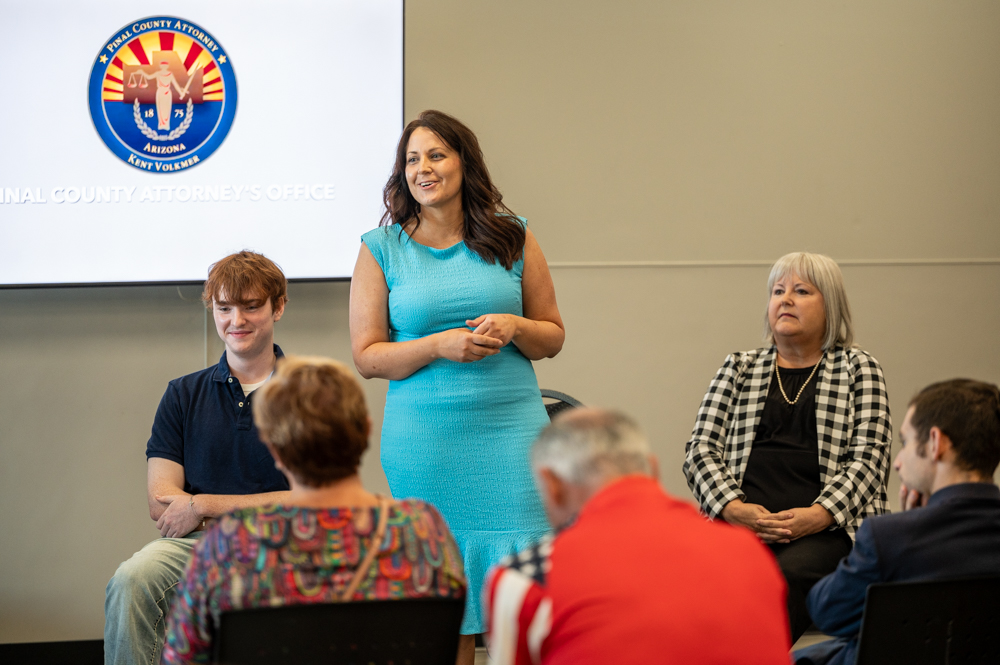Weed has never been so popular in Arizona. You can smoke it, vape it, drink it, eat it and even wear it.
A community discussion at Copper Sky on July 13 spiraled into a factually questionable conversation about teen marijuana use and its link — or lack thereof — to suicide.
Maricopa dignitaries met to discuss an array of topics including fraud, violence and suicide.
Priscilla Behnke, founder of the local youth coalition Be Awesome, voiced apprehensions about teen drug use in Maricopa.
“Kids should not be using marijuana,” she said.
Behnke highlighted cannabis use’s potential risks, including social withdrawal, attitude changes, school performance issues, behavior problems and depression.
She pointed the finger at the coronavirus pandemic, saying the shutdown isolated children and pushed many to the edge.
“It’s like we hit the accelerator on everything,” Behnke said. “We were already trending this way and now we have marijuana.”
During the community meeting, Behnke linked teen marijuana use directly to suicide, asserting that about 1 in 3 youth suicides in the U.S. is tied to cannabis. Her claim doesn’t hold water.
According to Cambridge University, “no detailed longitudinal study has examined suicide as an outcome [of] cannabis use,” while a National Institute on Drug Abuse study concluded it’s “unclear if marijuana directly increases a person’s risk of mental illness and suicide ideation.”
The issues may be correlated, but there’s no evidence of cause. For example, depression heightens the chances of both cannabis use and suicide, separately.
Furthermore, THC can be detectable in the body for up to three months, according to the American Addictions Center.
“I believe I misspoke,” Behnke told InMaricopa when confronted with the numbers. But she stands firmly by her statement that marijuana is a danger to teens.
Behnke’s figures were conflated from a five-year-old study of 62 youth suicides in Colorado, where recreational weed has been legal for over a decade. The study found marijuana present in blood in 30 percent of those suicides.
But toxicology reports weren’t available for 20 of the teens in that study. And it noted that marijuana use could have happened days, weeks or months prior to suicide and not been a factor.
The duration that marijuana remains in the bloodstream depends on several factors including frequency of use, metabolism, THC levels and hydration.
A report from the U.S. National Institute of Health found no direct correlation between suicide and cannabis.
But it remains a concern close to home.
Data from the Centers for Disease Control and Prevention reveals that Arizona’s suicide rate in 2021 was 30% higher than the national average.
And in Maricopa, Behnke said youth suicide attempts more than doubled in just two years — jumping from 11 in 2020 and to 24 last year.
“I don’t think it’s going to get better any time soon,” Behnke said.
Rather than alleviating the pain, marijuana can intensify depression and strip away inhibitions that might have prevented acting on suicidal impulses, according to some medical experts.
Regardless of connections to suicide, Behnke emphasized her belief that Arizona’s recent adoption of legal cannabis did little more than place drugs in the hands of vulnerable children and teens.
“We had a mental health crisis that was already forming and now it’s getting worse,” she added. “Now we’re telling them that marijuana is curing their problems.”
To combat the growing crisis, Behnke urged parents to have open and honest conversations with their children, highlighting the risks and dangers associated with teen drug use.
“Put your foot down,” she said. “They’re not your friend. They’re a kid.”
If you or someone you know is struggling with thoughts of self-harm or suicide, reach out to a trusted adult, mental health professional, or call the National Suicide Prevention Lifeline at 1-800-273-8255.
More resources can be found here.






![City gave new manager big low-interest home loan City Manager Ben Bitter speaks during a Chamber of Commerce event at Global Water Resources on April 11, 2024. Bitter discussed the current state of economic development in Maricopa, as well as hinting at lowering property tax rates again. [Monica D. Spencer]](https://www.inmaricopa.com/wp-content/uploads/2024/04/spencer-041124-ben-bitter-chamber-property-taxes-web-218x150.jpg)

![3 things to know about the new city budget Vice Mayor Amber Liermann and Councilmember Eric Goettl review parts of the city's 2024 operational budget with Mayor Nancy Smith on April 24, 2024. [Monica D. Spencer]](https://www.inmaricopa.com/wp-content/uploads/2024/04/spencer-042424-preliminary-budget-meeting-web-218x150.jpg)




![Alleged car thief released without charges Phoenix police stop a stolen vehicle on April 20, 2024. [Facebook]](https://www.inmaricopa.com/wp-content/uploads/2024/04/IMG_5040-218x150.jpg)





This is some high caliber reporting that is atypical of articles commonly found on this publication. Instead of merely regurgitating what essentially amounts to meeting minutes like most articles on this website do, this article actually considers the information that was presented, fact checks that information, and calls out those statements that were a misrepresentation of the truth even though those facts may be contrary to popularly held conservative opinions. Keep up the good work raising the bar for this little local website, Cameron!
It is certainly not linked to suicide, however it is not good for the developing brain. While teens may *think* they know everything their brains dkn’t stop developing until the early 20’s. But sadly it us rampant all over, just as it was when I was a teen.
Agreed that much like alcohol it’s bad for young developing brains, which is why recreational marijuana is also only legal to purchase if you are over 21. Children should not be taking drugs or alcohol, period. Using fallacious arguments to support this conclusion is a form of misinformation though, so I still applaud the writer of this article for calling that out and making that distinction.